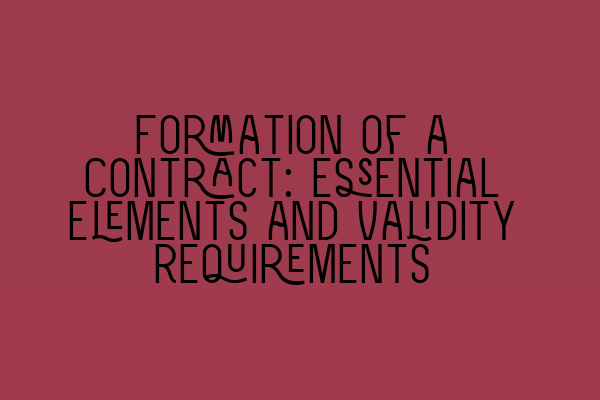Formation of a Contract: Essential Elements and Validity Requirements
Welcome to our comprehensive guide on the formation of a contract. Whether you are a law student studying for the SQE exams or a legal professional refreshing your knowledge, understanding the essential elements and validity requirements of contract formation is crucial. In this article, we will delve into the key components that make a contract legally binding and explore the various requirements that must be met for a contract to be valid.
Essential Elements of Contract Formation
For a contract to be enforceable, it must contain certain essential elements. These elements are:
- Offer and Acceptance: This is the cornerstone of contract formation. An offer is a proposal made by one party to another, indicating a willingness to enter into a contract. Acceptance must be unequivocal and mirror the terms of the offer. Boilerplate language or equivocal responses may not suffice. To learn more about offer and acceptance, check out our related article: SQE 1 Practice Exam Questions.
- Intention to Create Legal Relations: There must be an intention between the parties to create a legally binding relationship. This means that the parties must have genuinely intended to be legally bound by the terms of the contract. To understand more about this element, take a look at our article on practice mocks: SQE 1 Practice Mocks FLK1 FLK2.
- Consideration: Consideration refers to something of value given by each party to the other. It can be money, goods, services, or even a promise to do or refrain from doing something. Both parties must receive consideration for a contract to be valid. If you’d like to learn more about consideration, explore our SQE 2 preparation courses: SQE 2 Preparation Courses.
- Capacity: The parties entering into a contract must have the legal capacity to do so. This means that they must be of sound mind and age, not under any mental incapacity, and not subject to any legal restrictions. If you’re looking for SQE 1 preparation courses, we’ve got you covered: SQE 1 Preparation Courses.
Validity Requirements
In addition to the essential elements, there are certain validity requirements that must be met for a contract to be enforceable. These requirements include:
- Form: Contracts can be either written or verbal, depending on the circumstances. However, some types of contracts may require written form to be valid, such as those involving the sale of land or guarantee agreements. It is essential to understand which contracts must be in writing to ensure their validity.
- Legality: The purpose of the contract must be legal. It cannot involve unlawful activities or violate public policy.
- Consent: The consent of the parties must be free and voluntary. If one party was coerced, misled, or lacked the necessary information to make an informed decision, the contract may be deemed voidable.
These validity requirements help ensure that contracts are fair, just, and enforceable within the legal framework. If you’re curious about the upcoming SRA SQE exam dates, take a look at our article for more information: SRA SQE Exam Dates.
Understanding the essential elements and validity requirements of contract formation is crucial for anyone working in contract law. By incorporating these concepts into your legal practice, you can confidently assess the validity of contracts and ensure their enforceability in a court of law. Good luck with your contract law studies and preparations for the SQE exams!
